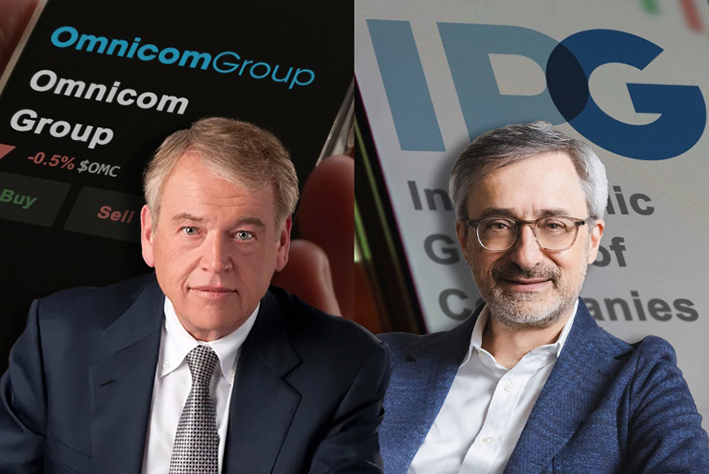US FTC approves Omnicom-IPG merger on condition it does not make ad decisions based on ‘political or ideological viewpoints’

The US Federal Trade Commission (FTC) has approved Omnicom Group’s $13.5bn acquisition of Interpublic Group.
The move clears a significant hurdle for the holding groups in their efforts to merge, which were first announced last December. Omnicom and IPG had both indicated they expected the deal to close before the end of the year, but as of the end of Q1 it still required regulatory approval in 18 markets, including the US, UK and EU.
Last week, the UK’s Competition and Markets Authority (CMA) opened an inquiry into the acquisition with the goal of assessing whether it would lead to a reduction in competition in the ad market.
The merged company would create the world’s largest advertising agency group.
Omnicom CEO John Wren said in the company’s last earnings call that the “expected closing” of the deal “will give the combined company substantial opportunities for revenue growth and distinctive cost synergy potential to drive increased profitability, EPS growth and free cash flow”.
That includes potential cost cuts and job losses. Wren previously said the combined entity would likely have $750m in run rate cost synergies, and that “integration planning is well under way to ensure we achieve our targets”.
As part of the FTC’s approval, the regulator accepted a proposed consent order that aims to address a prior FTC complaint by preventing anti-competitive actions by Omnicom over issues such as pricing, ad placement, sponsorships and campaign execution. The complaint had alleged ad agencies have coordinated “on decisions not to advertise on certain websites and applications”.
Uncertainty and soft guidance as holding groups struggle for growth in Europe
Analysis: A dangerous political caveat
The proposed consent order imposes restrictions to prevent Omnicom from colluding or coordinating “to direct advertising away from media publishers based on the publishers’ political or ideological viewpoints”.
Daniel Guarnera, director of the FTC’s Bureau of Competition, explained: “Websites and other publications that rely on advertising are critical to the flow of our nation’s commerce and communication. Coordination among advertising agencies to suppress advertising spending on publications with disfavored political or ideological viewpoints threatens to distort not only competition between ad agencies, but also public discussion and debate.
“The FTC’s action today prevents unlawful coordination that targets specific political or ideological viewpoints while preserving individual advertisers’ ability to choose where their ads are placed. I thank the FTC staff for their thorough investigation of this merger.”
The Trump administration, and Republicans more generally, have long complained of being silenced in online spaces, arguing often without evidence that advertisers have colluded to stop advertising against right-wing content.
Last summer, X, which is owned by Trump supporter Elon Musk, sued the Global Alliance for Responsible Media (GARM), the World Federation of Advertisers (WFA) and select brands, alleging they illegally conspired to boycott the platform.
The case was widely viewed as frivolous and lacking standing, given advertisers are free to choose where to advertise in an open market.
However, the Wall Street Journal reported this year that Musk had continued to use his influence over the Trump administration to “strongarm” advertisers into spending on his platform.
More recently, the Journal reported X has also threatened to sue advertisers directly if they do not spend with the platform. IPG and Publicis Groupe, the Journal reported, have subsequently caved to pressure by agreeing to spending deals with X, even though buying on the platform may not be in their clients’ best interests.
‘Weaponised’ litigation: Industry stands ground against X following GARM shutdown
While Guarnera’s statement does not explicitly mention X or any specific media owner, the language used appears to address similar grievances that “disfavored political or ideological viewpoints” have received less advertising support.
In reality, advertisers have chosen to avoid advertising with certain media owners over fears of brand safety and broader concerns around effectiveness, particularly as platforms like X have reduced content moderation efforts, leading to a higher degree or hateful speech.
Concerns over brand safety have also impacted investment decisions against premium publishers, The Media Leader reported this week.
As Ebiquity CEO Ruben Schreurs previously explained to The Media Leader: “Brands are free to decide where to invest their advertising budgets, based on the parameters that matter to their organisation. Similarly, organisations are free to create frameworks to classify advertising inventory as they see fit. It is up to brand advertisers and their agencies to decide where to advertise and where not to advertise.
“We live in a sad reality when brands deciding to avoid having their ads appear next to, for example, racial slurs is seen as an ‘illegal conspiracy’ against a platform that explicitly decides not to moderate the content of their users. But here we are.”




